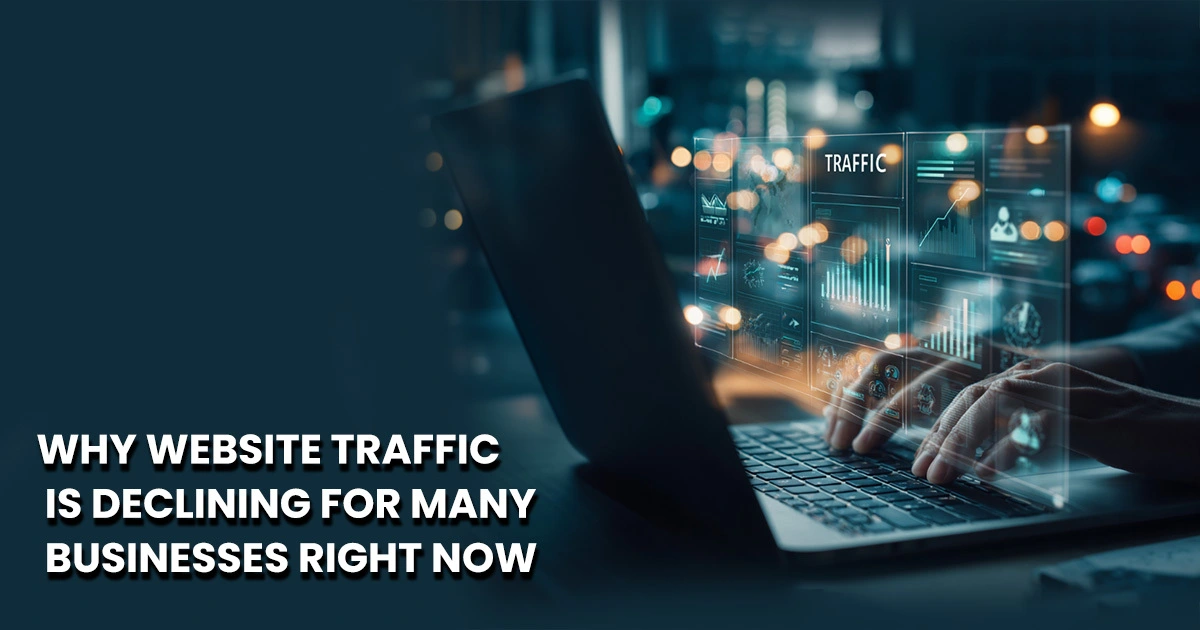Website traffic is the lifeblood of most modern businesses. It represents audience attention, potential customers, and the measurable success of your digital marketing efforts. So, when that traffic starts to dip, the panic can be palpable.
The alarming decline in organic traffic to many businesses is being observed today, and the causal factors are complex. It is not a short-term trend in the market, but a serious long-term change in the search environment, the main causes of which are the constant updates to the search algorithms used by Google and the fundamental changes in the very structure of the search engine result page (SERP).
For companies accustomed to traditional search engine optimization (SEO) methods, the existing environment is akin to an earthquake. Gaming is evolving, and the inability to keep up with the rules will result in one ending up in the digital dust.
The Unforgiving Hand of the Algorithm
The most immediate and disruptive factor is the relentless march of Google search algorithm updates. Google implements thousands of smaller changes every year; however, periodically, the company introduces its Core Updates that can result in huge volatility. The recent core and spam changes have been especially violent in attacking the content that is supposedly of low quality, not helpful, or simply created to manipulate the rankings.
Over the years, the SEO playbook recommended the creation of high-volume content, which frequently led to the creation of thin, repetitive, or scale-created pages through questionable automation means. Recent changes at Google have punished such content explicitly, resulting in the de-indexing of many of these sites and a ranking crunch of the rankings of numerous websites. This has nothing to do with the punishment of bad sites, but rather the marketing of actually useful sites that express Expertise, Experience, Authoritativeness, and Trustworthiness (E-E-A-T). Websites that failed to give their users first priority are now paying the cost through declining traffic to their websites.
Even in the case of excellent content, an update may lead to a temporary, anxiety-filled drop in the ranking of businesses as the systems of Google re-establish the balance and re-examine the whole web. What can be concluded is that SEO has ceased being a game of tricks and volume; it is a dedication to high-quality and value to the user.
Your SERP is Stealing Your Clicks.
The most annoying cause of decreased website traffic is, possibly, the structural transformation of the Google SERP. Google is retaining more users on its own pages in its effort to offer the quickest possible solution to a query made by a user, and in many cases, it is not necessary to even open a website.
This is referred to as zero-click searches. A user does not need to go to your page to receive an answer, but can immediately grab it through multiple features of Google SERP:
- Featured Snippets (Answer Boxes): These boxes displayed at the top of the page are a direct answer to the query of the user, making a click redundant.
- Knowledge Panels and Graphs: These give detailed information, which is factual, of people, places, and things on the results page.
- AI Overviews: The latest large-scale change is the addition of generative AI summaries to the SERP. These full AI-generated responses basically sum up a whole page of information, resulting in a click-through being unnecessary in informational queries.
The outcome is that even high-ranking organic listings will experience a drastic drop in the click-through rate (CTR). Even if a business may be at the top of the list, when a giant AI Overview is reviewing its content above that list, you are bleeding a lot of potential traffic before even your link can be seen.
Beyond Google: Shifting User Behavior
Although the changes at Google are the main factor, the overall user behavior is also one of the reasons why the organic website traffic is slowing down:
- The Emergence of Alternative Search Engines: An increasing number of users, especially young ones, are considering alternative search engines, such as TikTok, Instagram, and Reddit, as their information and product discovery tools. To illustrate, a consumer who needs a restaurant review or a product tutorial could begin the search process on social media and never look at Google.
- Heightened Dependence on Paid Search and Social: Since organic traffic becomes more difficult to attain and maintain, there is a greater allocation of funds to Google Ads, social media advertising, and other paid platforms by more businesses in order to keep up with the reach. This consequently crams the top of the SERPs with advertisements, moving the organic results down the page, leading to a further decrease in the CTR of the organic links.
- Technical Debt: Sluggish page loads, broken internal links, and bad mobile experience are contributing to a high bounce rate and bad user experience, which are now critical search engine ranking factors. Technically, debt sites are losing their rankings with resultant declining traffic on their sites.
What to do to Survive the New Search Era.
This downfall of the traffic is a nasty alarm, and it is also a chance. To make your business future-proof, your SEO strategy should move beyond a single-minded approach on ranking to a customer journey one-minded approach:

- Focus on Content that the AI Overviews find hard to replicate: The content that the AI Overviews cannot reproduce easily should be given priority. It consists of original research, special data, expert interviews, actual case studies, and conclusive product reviews with original photography or video content.
- Optimize for the SERP Features: Don’t attempt to rank; attempt to be the featured snippet. Organize your content by having powerful headings and using natural language to nourish Google systems and get your brand the on-page recognition, although the result may be a zero-click solution.
- Diversify Traffic Sources: Make sure you do not keep all your eggs in the Google basket. Create a strong ecosystem, which consists of a high-value email newsletter, substantial social media presence, and a strong video presence on YouTube or TikTok. Traffic that belongs to you, such as your email list, is traffic that even a Google search algorithm update will not be able to strip you of.
- Vision Build Brands: In the age of AI that summarizes everything, trust is of critical importance. Concentrate on developing a reputable, recognizable brand. Individuals will directly find your brand name, which will ensure that the CTR is high, despite having the first information with the help of an AI overview.
The depreciation of the site traffic is an indicator that the online platform has been radically altered. The companies that will flourish will be the ones that cease pursuing the old-time metrics of high-volume clicking and begin to concentrate on high-quality interaction, quality content, and the development of a direct and multi-channel relationship with their customers. Search engine optimization has entered a new era, and it is not all about cheating the system anymore, but delivering real value.
Frequently Asked Questions
Q: Are recent Google updates punishing all AI-generated content?
A: Not all, but Google is strictly targeting “scaled content abuse”—content generated primarily to manipulate rankings, regardless of whether it was created by AI or humans. Content must demonstrate genuine expertise and be useful to users to survive the latest updates.
Q: My average SERP position is stable, but my traffic is down. Why?
A: This is likely due to the “zero-click” trend. The Google SERPs are filled with features like AI Overviews and Featured Snippets that answer the user’s query instantly, drastically lowering your click-through rate (CTR) even if your position is technically still high.
Q: How can I protect my business from future algorithm updates?
A: Focus on E-E-A-T (Expertise, Experience, Authoritativeness, and Trustworthiness). This means publishing proprietary data, original research, and content written by verified experts. Also, diversify your traffic with email and social channels so you are not solely reliant on Google.




